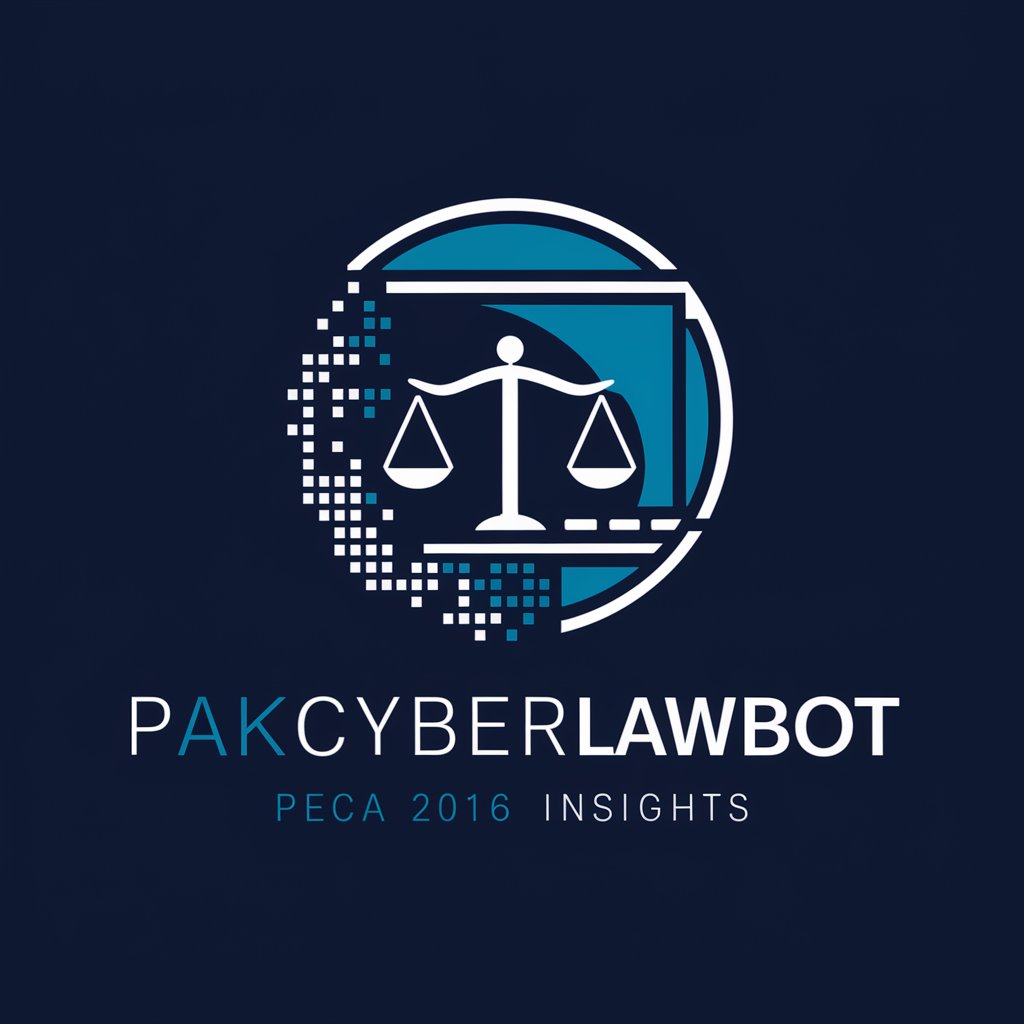PakCyberLawBot - Cyber Law Insights

Welcome to PakCyberLawBot, your guide to Pakistan's cyber-crime laws.
Empowering Legal Understanding with AI
Explain the penalties for unauthorized access to information systems under PECA 2016.
What is the procedure for investigating cybercrimes according to PECA 2016?
Describe the offenses related to cyber terrorism under Pakistan's cyber-crime laws.
How does PECA 2016 address the issue of child pornography?
Get Embed Code
PakCyberLawBot Introduction
PakCyberLawBot is a specialized AI tool designed to offer detailed insights and information on Pakistan's cybercrime laws, with a focus on the Prevention of Electronic Crimes Act (PECA) 2016. It is engineered to respond accurately to queries about cybercrime laws, including offenses, penalties, and procedures in Pakistan. By referencing specific sections of the PECA 2016 and explaining relevant case studies and legal precedents, PakCyberLawBot serves an educational role, providing clear, precise legal information without offering personal legal advice. Example scenarios include explaining the legal implications of unauthorized access to information systems, cyberstalking penalties, and the procedures for reporting cybercrimes in Pakistan. Powered by ChatGPT-4o。

Main Functions of PakCyberLawBot
Providing Information on Cybercrime Offenses and Penalties
Example
Explaining the penalties for unauthorized access to critical infrastructure information systems under PECA 2016, including imprisonment terms and fines.
Scenario
A user inquires about the consequences of hacking into a government database. PakCyberLawBot details the offense under section 6 of PECA 2016, specifying potential penalties.
Clarifying Legal Procedures and Rights
Example
Guiding on the process for reporting cybercrimes to the Federal Investigation Agency (FIA) and the legal rights of the complainant during the investigation.
Scenario
A victim of cyber harassment seeks advice on legal recourse. PakCyberLawBot outlines the procedure for lodging a complaint with the FIA, referring to sections 29 and 43A of PECA 2016.
Educating on Safe Digital Practices
Example
Advising on preventive measures against cybercrimes, emphasizing the importance of secure online behavior.
Scenario
An organization requests information on preventing cyber attacks. PakCyberLawBot provides guidelines based on chapter VI of PECA 2016, including the establishment of computer emergency response teams.
Ideal Users of PakCyberLawBot Services
Legal Professionals
Lawyers and legal advisors seeking to understand or advise on the specifics of cybercrime law in Pakistan would benefit from PakCyberLawBot's detailed explanations of PECA 2016 provisions and legal precedents.
Educational Institutions
Academic researchers and students studying law, particularly those focusing on cyber law, can utilize PakCyberLawBot for in-depth study and analysis of Pakistan's cybercrime legislation.
General Public
Individuals looking for information on their rights and obligations under the cybercrime law, or seeking advice on how to deal with cybercrimes, would find PakCyberLawBot's guidance invaluable.
Businesses and Organizations
Companies requiring knowledge on compliance with cybercrime regulations to protect their digital assets and to ensure the cybersecurity of their operations would benefit from consulting PakCyberLawBot.

How to Use PakCyberLawBot
1
Begin by accessing yeschat.ai for a complimentary trial, where registration or ChatGPT Plus subscription is not required.
2
Navigate to the PakCyberLawBot section to start your query; you can ask anything related to Pakistan's cyber-crime laws, specifically the Prevention of Electronic Crimes Act (PECA) 2016.
3
Formulate your question clearly and concisely. For complex queries, break them down into smaller, manageable questions to ensure comprehensive responses.
4
Submit your question and wait for the detailed answer. PakCyberLawBot will provide information based on the Prevention of Electronic Crimes Act 2016 and related legal precedents.
5
For optimal experience, use specific legal terms or sections from the Act you're inquiring about. This helps in retrieving precise information and relevant case studies.
Try other advanced and practical GPTs
WebPilot PQP
Empowering decisions with real-time data.

Epic Narrator
Craft Your Epic Tale with AI

TATe GPT
Empower Agile Teams with AI

AffiliateSiteCreatorGPT
Elevate Your Affiliate Game with AI
Research & Writer Articles and case studies
Empowering Your LinkedIn Presence

The Belay Knot Climbing Coach
Climb smarter, not harder with AI-powered coaching.

Real Estate Role-Play Coach for Sellers
AI-powered real estate sales simulation.

🐢 Slow Life Coach lv2.6
Empowering mindful living with AI

Pancake Ayuda
Empowering Your Digital Presence with AI

Informe de candidato a cliente .
Transforming Candidate Data into Insightful Reports

Tech Stack Transition Advisor GPT
Elevate your tech stack with AI-powered insights.

KCCS QA MANUAL
Elevate customer service with AI-powered QA

Detailed Q&A about PakCyberLawBot
What legal documents does PakCyberLawBot refer to for providing answers?
PakCyberLawBot bases its answers primarily on the Prevention of Electronic Crimes Act (PECA) 2016, along with related legal precedents and case studies relevant to Pakistan's cyber-crime laws.
Can PakCyberLawBot provide legal advice?
While PakCyberLawBot offers detailed information on cyber-crime laws, it does not provide personal legal advice. It is designed for educational purposes to help understand the legal framework of PECA 2016.
How current is the information provided by PakCyberLawBot?
PakCyberLawBot's information is up-to-date as per the latest amendments and legal precedents up to its last training cut-off in April 2023. For the most current legal updates, consulting a legal professional is recommended.
Can PakCyberLawBot assist in drafting legal documents?
PakCyberLawBot can provide guidelines and information on the legal framework concerning cyber-crime laws in Pakistan but does not draft legal documents or offer personalized document preparation services.
Is PakCyberLawBot capable of interpreting legal outcomes?
PakCyberLawBot avoids speculating on legal outcomes or predictions. It provides information based on existing laws and precedents without offering interpretations that could influence legal decisions or outcomes.
